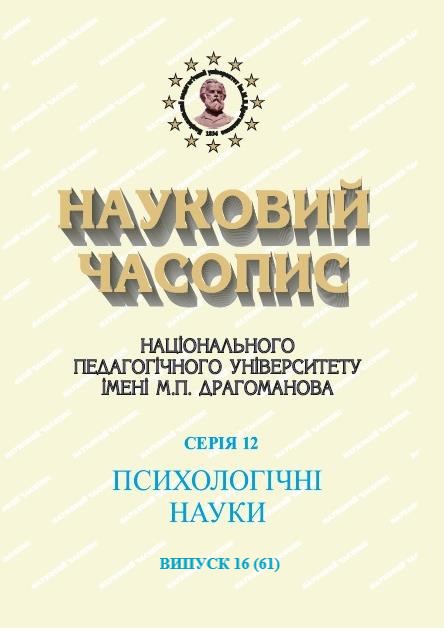FORMATION OF MOTIVATION OF DIFFERENT-AGED JUNIOR SCHOOLCHILDREN INTERACTION
DOI:
https://doi.org/10.31392/NPU-nc.series12.2021.16(61).03Keywords:
motivation, motives, different aged interaction, formation, junior schoolchildren.Abstract
The article highlights the results of empirical study of motivation formation among various aged children in junior school. Research methods: theoretical (the results of psychological research analysis and generalization); empirical (school documentation analysis, sociometric method “Choice of a partner for activity” by Y.L. Kolominsky, projective method “Diagnosis of junior schoolchildren’s moral self-regulation” by O.S.Bezverkhy, method “Incomplete sentences”); mathematical statistics (determination of percentages, χ2-criterion). It is determined that different age interaction occurs among the children that belong to the same age period but to its different stages, who have a difference in age of more than one year, and who are marked by the ratio of senior and junior positions. 30 primary school classes pilot study showed that new-day primary school classes are in fact different age groups, in which pupils are not peers, but children with 1 or 2 year difference. This fact pinpoints a very significant psychological distance between junior schoolchildren because of their intense mental and personal development. The junior schoolchildren motivation to interact with classmates that belong to different age groups was determined on the basis of business, positional, moral and value motive indicators. The best formed junior schoolchildren motives have been found out to be moral and value ones (31.8% of children with a high level and 60.2% with an average level), positional motives (21.6% of children with a high level and 57.2% with an average level) and finally, business motives among different age children interaction (18.6% of children with a high level and 47.1% with an average level). The formation of different aged children motivation to interact in junior school decreases due the gap between the familiar (moral and value) and really acting (business) motives. A better formation of moral and value motives indicates different aged junior schoolchildren’s desire to interact that represents a significant potential in the development of their partnership with children of other ages.
Referenses
- Avramenko, O.O. (2013). Sotsializatsiia ditei u riznovikovykh hrupakh doshkilnoho navchalnoho zakladu [Socialization of children in different age groups of preschool educational institution]. Candidate’s thesis. Uman [in Ukrainian].
- Maksymenko, S.D, Maksymenko, K.S, & Hlavnyk, O.P (2003). Adaptatsiia dytyny do shkoly [Adaptation of child is to school]. Kyiv : Mikros – SVS [in Ukrainian].
- Bushai, I.M. (2012). Psykholohichni osoblyvosti konsultuvannia ditei molodshoho shkilnoho viku [Psychological features of advising of children
of midchildhood]. Mizhnarodnyi naukovyi forum: sotsiolohiia, psykholohiia, pedahohika, menedzhment ‑ International scientific forum: sociology, psychology,
pedagogics, management. (pp.28‑35). Retrieved from http://enpuir.npu.edu.ua/bitstream/handle/123456789/6217/Forum_
Issue_10.pdf;jsessionid=2319582D6EBAC1691717F72155007365?sequence=1 [in Ukrainian] - Dziubko, L.V., & Shatyrko, L.O. (2019). Zapobihannia destruktyvnym formam vzaiemodii subiektiv osvitnoho prostoru, yak umova zberezhennia ta zmitsnennia psykhichnoho zdorovia osobystosti v ontohenezi. Materialiv IV vseukrainskoi naukovo-praktychnoi konferentsii. «Psykhichne zdorovia osobystosti u kryzovomu suspilstvi»‑ Materials of IV of allukrainian research and practice conferenc. "A psychical health of personality is in crisis society" (Lviv, October 18, 2019), (pp.82–84). Lviv : Lvivskyi derzhavnyi universytet vnutrishnikh sprav [in Ukrainian].
- Kyrychok, V.A (2014). Teoretychni osnovy vykhovannia moralnoi samosvidomosti molodshykh shkoliariv [Theoretical bases of education of moral self-consciousness of junior schoolchildren]. Teoretyko-metodychni problemy vykhovannia ditei ta uchnivskoi molodi – Theoretical and methodological problems of education of children and students, 8(1), 316–324. Retrieved from http://nbuv.gov.ua/UJRN/Tmpvd_2014_18%281%29__37 [in Ukrainian].
- Kuzmenko, V.U. (2000). Za vikom i za interesamy (komplektuvannia riznovikovykh hrup) [By age and interests (staffing of different age groups)]. Doshkilne vykhovannia – Preschool education,7, 19–20. Kyiv : Vydavnytstvo Svitych [in Ukrainian].
- Manzhelii, N.M. (2004). Orhanizatsiino-pedahohichni osnovy diialnosti silskykh navchalno-vykhovnykh kompleksiv «shkola – dytiachyi sadok» [Organizational and pedagogical bases of activity of rural educational complexes “school – kindergarten”]. Psykholoho-pedahohichni problemy silskoi shkoly: nauk. zb. UDPU im. P.Tychyny – Psychological and pedagogical problems of rural school: science. coll. UDPU them. P. Ticini, 8, 101–106 [in Ukrainian].
- Moskalenko, V.V. (2013). Sotsializatsiia osobystosti [Socialization of the individual]. Kyiv : Phoenix [in Ukrainian].
- Moskalenko, L.S. (2015). Psykholohichni umovy stanovlennia sotsialnoho statusu molodshoho shkoliara [Psychological conditions of formation of the social status of the junior schoolboy]. Fundamental and applied researches in practice of leading scientific schools Psychology, 4(10), 31–40 [in Ukrainian].
- Mostova, T.D (2021). Osoblyvosti psykholohichnoi hotovnosti uchyteliv pochatkovykh klasiv do profesiinoi diialnosti v umovakh realizatsii Kontseptsii «Nova ukrainska shkola» [Peculiarities of psychological readiness of primary school teachers for professional activity in the conditions of realization of the Concept “New Ukrainian school”]. Naukovyi chasopys
NPU imeni M.P. Drahomanova. Seriia 12. Psykholohichni nauky – Scientific journal of NPU named after M. Drahomanov. Series 12. Psychological sciences, 14(59), 72–79. https://doi.org/10.31392/NPU-nc.series12.2021.14(59).08 [in Ukrainian] - Nova ukrainska shkola: poradnyk dlia vchytelia [The New Ukrainian School: A Teacher’s Guide] (2017). In N. Bibik (Ed.). Kyiv : Vydavnychyi dim Pleiady [in Ukrainian].
- Pavelkiv, R.V. (2019). Ontohenetychni aspekty moralnoho stanovlennia osobystosti. Osobystist u konteksti moralnoho ta profesiinoho zrostannia [Ontogenetic aspects of moral formation of personality. Personality in the context of moral and professional growth].V. Pavelkiv, & N.V. Korchakova (Ed.). (pp.6–22) Kyiv : Tsentr uchbovoi literatury [in Ukrainian].
- Pechenko, I.P. (2004). Riznovikova vzaiemodiia vykhovantsiv kompleksu «shkola – doshkilnyi navchalnyi zaklad» yak chynnyk sotsializatsii [Age-related interaction of pupils of the complex “school – preschool educational institution” as a factor of socialization]. Psykholoho-pedahohichni problemy silskoi shkoly – Psychological and pedagogical problems of rural school, 9, 193–197 [in Ukrainian].
- Prykhodko, Yu.O. (1987). Formuvannia pozytyvnykh vzaiemyn u dytiachomu kolektyvi [Formation of positive relationships in the children’s team]. Kyiv : Radianska shkola [in Ukrainian].
- Smolnykova, H.V. (2014). Metody doslidzhennia spilkuvannia ditei v umovakh riznovikovoi hrupy [Methods of research of communication of children in the conditions of different age group]. Naukovyi chasopys NPU imeni M.P. Drahomanova. Seriia 12 – Scientific journal of NPU named after M. Drahomanov. Series 12. Psychological sciences, 43, 313–319 [in Ukrainian].
- Tryshnevska, H.B., & Oliinyk, N.Yu. (2003). Osoblyvosti formuvannia osobystosti molodshoho shkoliara u riznovikovomu kolektyvi [Features of the formation of the personality of a junior student in a team of different ages]. Psykholoho-pedahohichni problemy silskoi shkoly – Psychological and pedagogical problems of rural school, 5, 169–173 [in Ukrainian].

